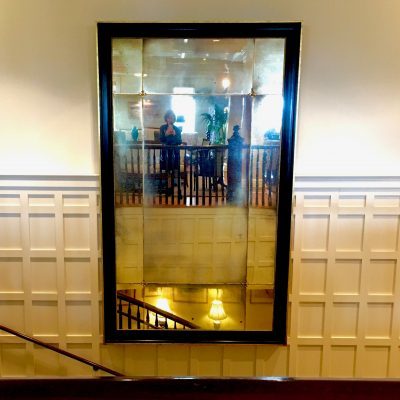Barbara Delinsky's Blog, page 3
December 29, 2017
Why I Hate New Year’s Resolutions
Think about it. And be honest. What resolution have you made in, say, the last five years that you’ve actually seen all the way through?
If you’re anything like me, you’re stuttering, trying to come up with one. Because the resolutions we make for ourselves are all wrong. They are large and lofty – usually things like losing a ton of weight, working out an obscene amount each week, or learning a foreign language when we have zero time to study.
There’s little chance we can keep resolutions like these. We may have the best of intentions until life gets in the way – which it always does. And when we break that resolution less than a week into January, we start the new year with failure. This is why I hate making New Year’s resolutions. Being a failure is the pits. But I set myself up for it, year after year.
Not this year. This year I’m being real.
That’s my first resolution. I’m choosing to achieve progress, rather than perfection – like cutting back on diet soda, adding five minutes to my work-out on weekends alone, and each week calling a friend with whom I haven’t talked in too long a time. I can do these things. They’re totally attainable, and they make me a better person.
There’s something else I’d like to do. Somehow, we Americans have become a population of ugly words and accusations. But this country was founded on the concept of e pluribus unum — out of many, one. We need to restore this concept to our credo. So, if you’re looking for a resolution that is do-able, consider this:
Please join me in resolving to speak more gently, to hear more keenly, and to reach out with greater compassion. We can do this. Failure isn’t an option.
Connect with me on social media: Twitter, Facebook, my new Street Team (click to join for fun, exclusive things I’m dreaming up), Pinterest, Instagram, and that’s it for now. I need time to write my books!
Pre-order Before And Again on Amazon now! Kindle, hardcover, and audio.

December 11, 2017
This is the Reason I Hate my Camera
Well, I don’t really hate my camera. I actually love it. I just hate the selfies it takes. They’re awful – make me look tired and old. From what I read, I’m not alone in selfie-hate. From what I read, there are scientific explanations for the notorious badness of selfies. From what I read, the most adamant selfie-takers use apps that automatically make them look better.
I tried one of those apps. I tried a second. And okay, they’re better. But they make me look not like me at all. So I’m settling for picking an angle that hides my flaws, wearing dark glasses, or hiding my face behind my camera.
And that’s kind of how I became a photographer. I much prefer to be the taker than the takee, which means, of course, that my family members have a slew of photos of themselves and fewer of me. I am the family photographer.
Which was actually a good thing way back when, because photography was how I discovered writing.
Photography, Cameras, and Writing, Oh My!
When my oldest son was an infant, I decided that a mother at home with her child was the one who could take the best pictures. So I borrowed an SLR from a friend and taught myself how to use it. Film was the medium then, and the processing and printing weren’t cheap. So I learned how to do that myself as well – but then, renting darkroom space cost money, too. To support the habit, I took a job in my local newspaper photographing local businesses.
One day, the editor asked me to write an article to accompany my picture. I did it in two seconds; they liked what I did; I was asked again, and again. Likewise, when I volunteered as a photographer for a charity organization. Before long, I was writing speeches for the organization’s president – all of which made me realize, for the first time, that I could write when others could not. THEN, when I read an article in The Boston Globe about women who wrote novels while raising families, I was primed to try it myself.
Those Who Can’t Do, Teach
Even after I wrote my first novel, I kept at photography. I had three children now, and we no longer lived near that other newspaper, so I supported the habit by teaching photography twice a week at an adult education program. There’s an old saying, “Those who can’t do, teach.” You’re looking at a perfect example. I was hired once to photograph a fashion show; I got to the venue and my flash unit didn’t work. Another time I photographed a would-be actor and not one of the shots came out crystal clear. But I was a very good teacher.
Writing About Cameras and Photography
I’ve put photography into a number of my books and am doing it again in my next one, the first pages of which I write as I write this blog. I’ve actually just sold my old Nikons and am treating myself to a new Fuji, which is mirrorless and far lighter. That said, photography isn’t about equipment, but about the photographer’s eye, which was one of the things I said over and over again when I taught.
But more on photography in later blogs. For now, getting back to selfies, I’m trying to think of a novel way to take ones that I like. Here’s a possibility. I took it in Rhode Island last April when I was at Ocean House to keynote a fundraiser. It’s kind of an interesting mirror, don’t you think?
Connect with me on social media: Twitter, Facebook, my new Street Team (click to join for fun, exclusive things I’m dreaming up), Pinterest, Instagram, and that’s it for now. I need time to write my books!
Pre-order Before And Again on Amazon now! Kindle, hardcover, and audio.
November 11, 2017
Is listening to audiobooks cheating?
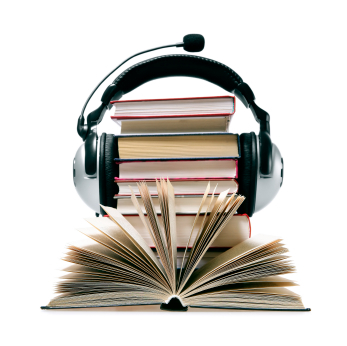 I didn’t always listen to audiobooks. I’m very much a visual person, who needs a map in my hand. When it comes to books, I like to hold them. I like being able to skip back and forth when I’m confused. I even like being able to read the ending before I reach it, so that I can focus on the process rather than worry about how it ends. Bottom line? I like to see the written word on the page in front of me.
I didn’t always listen to audiobooks. I’m very much a visual person, who needs a map in my hand. When it comes to books, I like to hold them. I like being able to skip back and forth when I’m confused. I even like being able to read the ending before I reach it, so that I can focus on the process rather than worry about how it ends. Bottom line? I like to see the written word on the page in front of me.
Then, several years ago, a bookseller at my local Indie held out an unabridged CD that she highly recommended, and I considered taking the leap. Up to that point, most books, my own included, were abridged – likely to minimize the cost of making an unabridged version at a time when the audience of listeners was small. Then costs came down, narrating audiobooks became a business for would-be actors, the audience grew, and abridged versions were ditched.
And still, I didn’t listen to audiobooks. Believe it or not, I’ve never, to this day, listened to one of my own books on tape. I already know the story, right?
That day, though, when my Indie bookseller suggested listening to a book, something clicked. Bluetooth made listening in a car very easy, and, at that time, I was spending five hours each weekend driving back and forth to the lake to join my husband. Making the most of car time was an incentive. But there was more. I have this … thing about keeping my mind agile against the ravages of age. I’ve always done crossword puzzles. And writing books is surely a mental challenge. But suddenly I wondered if I could train my mind to listen. Listening meant focusing on every word, staying ever-present, not wandering off. It required mental discipline. I saw that as a new challenge.
What began as a mental exercise turned into a joy. I lost my audio virginity with that first bookseller recommendation, Lianne Moriarty’s The Husband’s Secret, which I loved. Other books followed, like Ann Patchett’s Commonwealth, Jojo Moyes One Plus One, Nutshell by Ian McEwan, Frederick Backman’s A Man Called Ove, and most recently, Judas, by Amos Oz.
I used to listen only summers, driving back and forth to the lake. But that’s changed. Now I listen whenever I’m in my car for more than 10 minutes. I’ve become a true advocate of the audiobook format.
Recently, though, while I was pushing the merits of this, a friend commented that listening to a book was cheating, that it wasn’t really reading, that it was more like theater and can’t be considered the same as using one’s eyes and turning a page.
She was right in a sense. A good reader (or multiple readers, as some books now have) adds an element to the reading that might not otherwise be there. Books that come to mind are One Plus One and A Gentleman in Moscow, both of which were standouts for me because of the skill of the narration. More generally speaking, I’m able to finish books that friends of mine are not, simply because the reader makes them enjoyable. Is this wrong? Is listening to a book cheating? Is it really reading?
When we read to a child at bedtime, is it really reading? Yes! It’s using an author’s words to draw a child into a story, is it not?
I see audiobooks the same way. Actually, even more so, if you consider the fact that when I listen to one, I hear every word. Oh, it took me a while. That first time, I had to pull back my wandering mind time and again. I had to do it less with the second book, and less with the third. Okay. I’ve listened to a few audiobooks that are bad. I returned one to Audible that, though highly reviewed, was not my style at all. I stopped listening to another that, while beautifully written, was so intense, so frustrating, so politically infuriating that I simply couldn’t bear it. On the whole, though, I’ve read more books because I’ve listened to them, than I would have otherwise.
Is this wrong? Cheating? Or is it simply my wanting to go back to a childhood where there was no one to read me books? So maybe, just maybe, there’s an emotional benefit for me, a pampering, if you will.
And then, consider this. For those of you who say you don’t spend enough time in cars to listen, what about walking? We all need exercise. Walking costs nothing, we can do it most anywhere, and, wearing a set of ear pods, we can listen to books and enhance our minds while our bodies get healthier. We can kill two birds with one stone, so to speak. How can this be wrong?
Your thoughts here?
September 27, 2017
I'm incubating …

Incubating. What does that mean, someone recently asked. This person had first asked if I was taking a break, now that my new book is finished and in production. Lord, no, I said. Writing is what I do. It’s what I think about when I’m up the creek without a paddle – e.g., in the dentist’s waiting room, in the supermarket checkout line, or lying awake at two in the morning worrying about nuclear war. Writing keeps me sane.
Not to mention the fact that I already have a contract for my next book, which is a sure thing for enforcing inspiration.
Right now, it’s about incubating. Those plots you love to read have to be dreamed up, fleshed out, and woven together. First, though, there’s the nitty gritty.
Location. This is generally the easiest for me, so I pick it first. New England is my place. But I work backward to see where in New England I haven’t taken you in a while. My newest book (pub 6.26.18 and title/cover reveal next week) is set in Vermont. The one before that, Blueprints, is set in suburban Boston, Sweet Salt Air on an island in Maine, Escape in New Hampshire. For this new setting, it’s also about where I want to spend the next eighteen months. My current answer is the Rhode Island shore, where, coincidentally, I’ve been spending more time myself – as per the photo above, which I took last April in Westerly.
Theme. Sometimes this comes from my choice of location. Think ocean, and I think grains of sand, timelessness, and generational continuity. I think of the way life shapes each of us to be unique, like those ever-tumbling, ever-different grains of sand. Or the way life mellows us, like the ocean smoothing the edges of sea glass. Alternately, I may choose a theme that is current and captivating. Political issues come to mind – though I cannot write about those. Not what my readers want. Not keeping me sane. I have several themes in mind for this new book, but the final choice is still up in the air.
Names. I spend a ton of time choosing them – for the main characters, at least – and it’s fun. Names have to fit the story and the setting. They have to fit the history of the characters’ families. I use telephone books and obituaries. I check government lists for the year a character is born. I’m big on the rhythm of names, so I say them aloud – first, last, and nicknames – and pair them with other major names in the story to make sure they flow. Sometimes a name just clicks as one I want to write about. I’ve chosen ones for the women in this book, a set of triplets, two of whom are identical, one not (it does happen biologically, totally aside from the way it did on This Is Us, which I adore). I’m working with Morgan, Ashley, and Olivia Aldiss, Olivia being the main voice. I’ve had more trouble naming my male protagonist, stuggling for one that is strong but not soap-opera chic. I was leaning toward Thomas, then ran that, Nathaniel, and Colby past my Facebook followers, who overwhelmingly chose Nathaniel. My editor wasn’t wild about that one. So it may be Nathaniel. Or Calvin. Calvin’s been resonating with me of late. Calvin MacKay, Calvin LeVeque, Calvin Duran. Calvin MacAllister.
Occupation. What works with the location? What works with the theme and with these particular characters, as their lives start to take shape in my mind? What works for me – i.e., what interests me? What do I know? What don’t I know? What can I learn? Right now, I’m seeing my male protagonist as a veterinarian, which is the last thing his family would have chosen but which gives him the unconditional love they never did. My female protagonist, Olivia, mother of a bookish ten-year-old son, may be a psychotherapist, though that’s still up for grabs. Whatever, my characters’ occupations have to work with the plot vehicle.
Aha. Plot vehicle. This is crucial. If I want my book to be a page turner, I need a vehicle that will take readers from start to finish without more than a two-minute stop. In recent books, I’ve worked with a current issue, such as computer hacking in my June 2018 book or ageism in Blueprints – or with a timeless one, such as health crises in Sweet Salt Air and While My Sister Sleeps. As you probably sense, I haven’t settled on one for this next book. But I’m working on it. This is what I think about most when I’m up aforesaid creek without a paddle.
Okay. Next comes the opening scene. Dreaming this up – actually writing it – gets me in the mood. But it isn’t a frivolous exercise. The opening pages are my very first sales tool. It’s what everyone reads first – not only you readers, but well before that, my publisher and her team, who need to be excited enough about a book to aggressively market and sell it.
Ideally, I also dream up the closing scene. Yup, I try to do that now, before I’ve even begun to write the book. It’s like climbing a mountain, needing to see that peak at the end of the trek.
So that’s what I’m doing as you all wait for the next book. I’m incubating.
Any questions?
The post I'm incubating … appeared first on Barbara Delinsky.
I’m incubating …
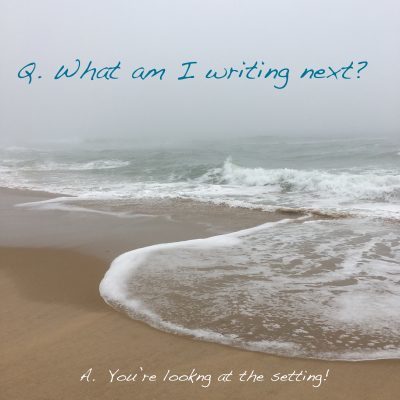
Incubating. What does that mean, someone recently asked. This person had first asked if I was taking a break, now that my new book is finished and in production. Lord, no, I said. Writing is what I do. It’s what I think about when I’m up the creek without a paddle – e.g., in the dentist’s waiting room, in the supermarket checkout line, or lying awake at two in the morning worrying about nuclear war. Writing keeps me sane.
Not to mention the fact that I already have a contract for my next book, which is a sure thing for enforcing inspiration.
Right now, it’s about incubating. Those plots you love to read have to be dreamed up, fleshed out, and woven together. First, though, there’s the nitty gritty.
Location. This is generally the easiest for me, so I pick it first. New England is my place. But I work backward to see where in New England I haven’t taken you in a while. My newest book (pub 6.26.18 and title/cover reveal next week) is set in Vermont. The one before that, Blueprints, is set in suburban Boston, Sweet Salt Air on an island in Maine, Escape in New Hampshire. For this new setting, it’s also about where I want to spend the next eighteen months. My current answer is the Rhode Island shore, where, coincidentally, I’ve been spending more time myself – as per the photo above, which I took last April in Westerly.
Theme. Sometimes this comes from my choice of location. Think ocean, and I think grains of sand, timelessness, and generational continuity. I think of the way life shapes each of us to be unique, like those ever-tumbling, ever-different grains of sand. Or the way life mellows us, like the ocean smoothing the edges of sea glass. Alternately, I may choose a theme that is current and captivating. Political issues come to mind – though I cannot write about those. Not what my readers want. Not keeping me sane. I have several themes in mind for this new book, but the final choice is still up in the air.
Names. I spend a ton of time choosing them – for the main characters, at least – and it’s fun. Names have to fit the story and the setting. They have to fit the history of the characters’ families. I use telephone books and obituaries. I check government lists for the year a character is born. I’m big on the rhythm of names, so I say them aloud – first, last, and nicknames – and pair them with other major names in the story to make sure they flow. Sometimes a name just clicks as one I want to write about. I’ve chosen ones for the women in this book, a set of triplets, two of whom are identical, one not (it does happen biologically, totally aside from the way it did on This Is Us, which I adore). I’m working with Morgan, Ashley, and Olivia Aldiss, Olivia being the main voice. I’ve had more trouble naming my male protagonist, stuggling for one that is strong but not soap-opera chic. I was leaning toward Thomas, then ran that, Nathaniel, and Colby past my Facebook followers, who overwhelmingly chose Nathaniel. My editor wasn’t wild about that one. So it may be Nathaniel. Or Calvin. Calvin’s been resonating with me of late. Calvin MacKay, Calvin LeVeque, Calvin Duran. Calvin MacAllister.
Occupation. What works with the location? What works with the theme and with these particular characters, as their lives start to take shape in my mind? What works for me – i.e., what interests me? What do I know? What don’t I know? What can I learn? Right now, I’m seeing my male protagonist as a veterinarian, which is the last thing his family would have chosen but which gives him the unconditional love they never did. My female protagonist, Olivia, mother of a bookish ten-year-old son, may be a psychotherapist, though that’s still up for grabs. Whatever, my characters’ occupations have to work with the plot vehicle.
Aha. Plot vehicle. This is crucial. If I want my book to be a page turner, I need a vehicle that will take readers from start to finish without more than a two-minute stop. In recent books, I’ve worked with a current issue, such as computer hacking in my June 2018 book or ageism in Blueprints – or with a timeless one, such as health crises in Sweet Salt Air and While My Sister Sleeps. As you probably sense, I haven’t settled on one for this next book. But I’m working on it. This is what I think about most when I’m up aforesaid creek without a paddle.
Okay. Next comes the opening scene. Dreaming this up – actually writing it – gets me in the mood. But it isn’t a frivolous exercise. The opening pages are my very first sales tool. It’s what everyone reads first – not only you readers, but well before that, my publisher and her team, who need to be excited enough about a book to aggressively market and sell it.
Ideally, I also dream up the closing scene. Yup, I try to do that now, before I’ve even begun to write the book. It’s like climbing a mountain, needing to see that peak at the end of the trek.
So that’s what I’m doing as you all wait for the next book. I’m incubating.
Any questions?
August 11, 2017
Give me back my Internet!

An awful thing happened yesterday. At two in the afternoon, I lost my Internet connection. Oh, my Wifi still had full signal, but Comcast was not reaching it.
This wasn’t a total surprise. I’d been hearing trucks outside my window during the few hours preceding that and figured work was being done in the neighborhood. So I waited a few minutes, then tried again. Nothing. I waited a little longer, then tried again. Nothing. I tried my tv, which also connects via Comcast. Nothing.
Fortunately, my phones use Verizon. So I called Comcast. Five minutes of automated menu options later, I was put on hold to wait for an agent. After total silence for another 10 minutes, I hung up and called back. This time, quickly enough, I heard a recording saying that there was an outage an the area and that power would be restored at 5:21 pm. Given an exact time, I was heartened!
That was when I finally returned to my computer to work. I finished the cover letter for my revised manuscript and, feeling delighted to have it done, went to email it to my editor. But, of course, I could not. No Internet connection. Giving Comcast a little more time, I decided to make an Instagram post. But, of course, I could not. No Internet connection. I decided to e-order the book my husband wanted, its title and author jotted on a Post-It on my desk. But, of course, I couldn’t order it without an Internet connection. I couldn’t even check Comcast’s website to see if there was an update.
5:21 came and went. Our tv did come back on, but not Internet or email. I called Comcast again. After spending 50 minutes on the phone with a lovely woman who tried to talk me through rebooting the modem, we concluded that I needed a service call.
Sunday, she said. I told her I needed it fixed within 12 hours because I had work issues – which, BTW, were monumental. At least, I hope you all will think that. I finished doing the revisions on my new book and had just put together a document detailing the changes I either made or did not make, when the Internet had gone out. How to e-mail a 441-page manuscript to New York without it? Not happening.
So the lovely woman at Comcast went back to the drawing board and promised someone here today at 10. He did come. Three hours later, I was reconnected to the web. Seems that the work Comcast had done outside caused a power surge that, even with my surge protectors, killed my modem.
All’s well that ends well. I’m back online, posting this blog, which I would not have been able to do at this time yesterday.
But what a lesson this is about how dependent we’ve become. I can’t tell you how many times late yesterday, yesterday evening, and this morning, I turned to my computer to do something, only to realize I couldn’t do it. No Googling. No Instagram. No checking websites or Facebook. No ordering books online. No reading the news, which is just as well. But think what would happen if the entire Internet grid was disabled. Okay. Maybe that would never happen, given the scope of different connectivity options. Still, if a foreign country wants to mess us up, all they have to do is to go after the biggest of our links to the web. Seriously.
Are you as dependent on being online as I am?
July 20, 2017
I remember seven spectacular summers …

This summer of 2017 has been amazing for me in a totally unexpected way. My nine-year-old granddaughter went to sleep-away camp for the very first time – 3½ weeks at a girls’ camp in Vermont. Every night, her camp posts several hundred photos taken that day, so that parents can see their daughters in action. Thanks to my son and daughter-in-law linking me in, I’ve been checking out photos each morning for the last 3½ weeks.
I can pick out Ruby in a heartbeat. She has a huge, infectious smile. I’ve seen her playing tennis and volleyball, doing archery, and paddle-boarding. I’ve seen her working with clay, reading a book, acting in a play. I’ve seen her dancing, doing gymnastics, making do-it-yourself sundaes, climbing a mountain, and wearing green make-up, green beads, green tee shirt and tutu after being named to the green team, to which she will belong for as long as she returns to the camp – and I’ve thoroughly loved every one of these pictures, mostly because of how happy she looks.
But a funny thing happened at the two-week point. I began seeing more shots of Ruby arm-in-arm with friends. This being the first summer camp experience for most of the girls her age, it has taken two weeks for them to bond. I know this. I’ve lived it. Watching the progression with Ruby, I found myself tearing up time and again.

I went to sleep-away camp for seven summers, celebrating my 9th birthday there the first year and my 15th birthday there the last. I went to the same camp all seven years, progressing from the youngest bunk to the oldest. The pictures here are all, in fact, of my camp. For those eight weeks, I lived in one of the above bunks with seven other campers, two counselors, and no electricity. At my camp, all 165-or-so campers went for eight weeks; there was no shorter option. And while there was parents’ visiting weekend in the middle, my camp immersion was total.
Those summers were, hands-down, the happiest times of my childhood.
Seeing Ruby brought it all back. For starters, we had similar daily activities. We did softball and volleyball, archery and tennis. We did swimming twice each day. We did arts and crafts, and party-prep when a bunk-mate had a birthday. We climbed mountains, took canoe trips, and sang at campfires. We cheered our hearts out for our teams during color war.

But we also bonded. Big time. Spending eight weeks together is conducive to that. At the end of each camp summer, after a huge color-war build-up, a final banquet, and much trepidation about leaving my friends, I was always in tears driving home. My parents never understood that, were actually offended, I think. But when my only son who chose overnight camp did the same thing, I got it. His tears were a sign not that his family was that bad, simply that camp friends were that good.
Yes, it was about friends. I had them at camp in ways I never had anywhere else until I started college. Though I was from Boston, my camp friends were from New York, Washington, Cleveland, Memphis, and Houston. We didn’t have email back then, so we spent our winters snail-mailing. The closer summer came, the more we anticipated the camp season to come, seeing each other again, doing new activities and enjoying new privileges the older we got.

Ruby’s pictures brought all this back. Seeing her with her friends, all of them in their ‘blues and whites,’ with the red plaid sash crossing their torsos, I remembered. My camp didn’t have sashes, and our colors were blue and brown. But the joy of camaraderie was exactly the same.
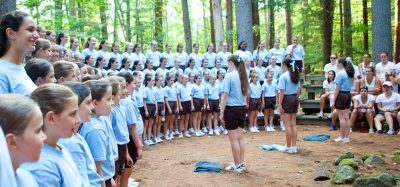
I treasure these memories, always have, always will.

P.S. As I said earlier, the pictures above are from the camp I attended those seven summers, Camp Pinecliffe in Harrison, Maine. I found these shots online and include them here for you to get a feel for where I was. Believe it or not, the camp looks exactly the same in these shots as it did when I went. And trust me, I would have used photos of my own if I’d had them. Oh, I did once. But when I was 19 and we sold our family home and moved into an apartment, the cartons with my childhood memories were all thrown out. I was not there. I was not asked if I wanted them. I lost a big piece of my life when someone tossed them away. That said, I do have my memories. Or, as one of the characters in my new book says, “Life changes but memories don’t.”
June 27, 2017
What is patriotism?
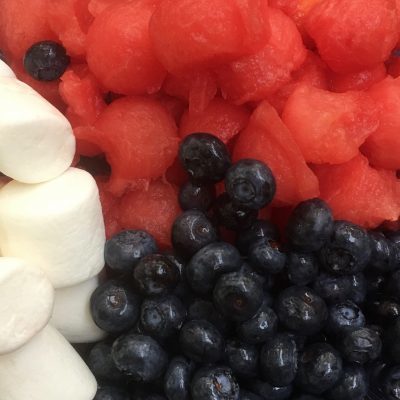
I’m playing with words again, but, hey, that’s what being a writer is about. And now, with another Fourth of July here, the concept of patriotism comes front and center.
By definition, ‘patriotism’ means vigorous support for one’s country. And while I’m not one for marching in a parade brandishing guns, certainly not one for blind support of our leaders when I think they are wrong, I do like to celebrate this land that I love on the Fourth of July. For a Bostonian, born and bred like me, that means listening to the annual Boston Pops concert on the Esplanade. I adored our late, great conductor, Arthur Fiedler, who was such a unique presence with his white hair and mustache, his musicality and his flair for humor. Keith Lockhart is conducting now, and many of the musical choices have grown younger to fit the celebrants, but three staples remain. One is John Philip Sousa’s march, “The Stars and Stripes Forever,” during which a huge American flag unfurls behind the orchestra, down the back wall of the Hatch Shell. Another is Tchaikovsky’s iconic “1812 Overture,” replete with cannon fire along the Charles, bell-ringing in every nearby church belfry, and the kickoff of a spectacular fireworks show. The third is the patriotic singalong.
There’s that word again, patriotic. We don’t usually parse the lyrics of songs, but consider these images.
O beautiful for spacious skies,
For amber waves of grain,
For purple mountain majesties
Above the fruited plain …
Or,
From the mountains, to the prairies,
To the oceans white with foam …
Or,
When the sun come shining, then I was strolling
In wheat fields waving and dust clouds rolling;
The voice was chanting as the fog was lifting:
This land was made for you and me.
I get goose bumps even typing these words. America is beautiful, and respecting her beauty – preserving it – is our responsibility as Americans. It’s like the human body. You don’t bathe, you smell. You eat the wrong food, you get sick.
Same with the environment. If we don’t take care of it, it goes bad. I don’t want that. I have nine grandchildren, and I want our air clean and our land bright for not only them, but for their children and grandchildren, as well. And it is a global issue. Common sense says that. Those who would deny it are burying their heads in the sand – which, BTW, is a phrase that comes from the habit ostriches have of hiding their faces when predators approach.
That, my friends, is the way of a coward. It takes courage to stand up for what is right.
And that is what patriotism means to me. It means making the courageous decision. It means seeing the whole picture of what American is and does. It isn’t about one person or one group or one set of jobs, and it sure isn’t about politics or ego. It’s about ensuring a healthy future for all Americans.
Let’s pray for that, this Fourth of July 2017.
March 30, 2017
The art of the apology
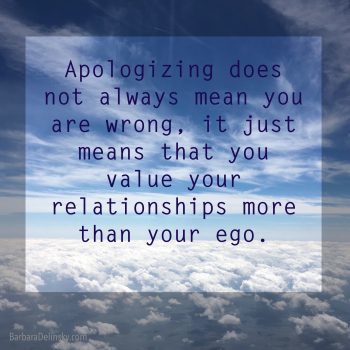
“I’m sorry,” she said in horror.
Embarrassed, she said, “I’m really sorry.”
“I am so, so sorry,” she said with heartfelt regret.
I write these words in my books all the time. In fact, I’m about to write a pivotal scene in Making Up in which apologies are key. It’s between mother and daughter, Margaret and Mackenzie, ages 60 and 38 respectively, and they’ve been estranged for nearly five years. Suddenly, now, again, they need each other in that deepest familial way. Apologies, truly, are their only path forward.
Do you apologize when you’ve done wrong? I do. I do it all the time. And it isn’t that I make more mistakes than other people, just that I believe apologizing when I’ve been wrong – or insensitive – or short-sighted, is the right thing to do. And it isn’t always easy. To offer an apology means admitting to making a mistake. It means taking responsibility for it. It often entails humbling oneself and then committing to change.
Apologizing can also mean that you’re sorry not for what you did, but for doing something that causes another person to be upset. This is one of the best ways to get things moving after butting heads on an issue.
Ideally, we’re taught to apologize when we’re kids. I remember standing my sons in front of me after they’d misbehaved and waiting for – insisting on – lecturing them about the importance of the apology.
Many see an apology as a sign of weakness. I do not. Sure, the person who apologizes over and over again for the same misdeed is being insincere. But the heart-felt apology is a sign of character. It’s about setting a good example, about being a strong role model. No one of us is right all the time. In today’s world, life unfolds at a breakneck pace. We think things fast, say things fast, spread things fast. Inevitably, mistakes happen, and we say or do something that we later realize is wrong – and if not wrong, then certainly hurtful.
The person who offers an apology when an apology can help is not only strong. He is confident. He is honest. He thinks beyond himself to the good of someone else.
So what about the person who won’t apologize – the one who is too arrogant or thin-skinned to admit he made a mistake? Does that person think he is simply above everyone else? Does he think social discourse can survive without honest give and take?
Our president doesn’t apologize. Is it a man thing? Or a Trump thing?
Whatever, Margaret and Mackenzie are about to do it, and I couldn’t be more proud.
March 8, 2017
A Woman's Place
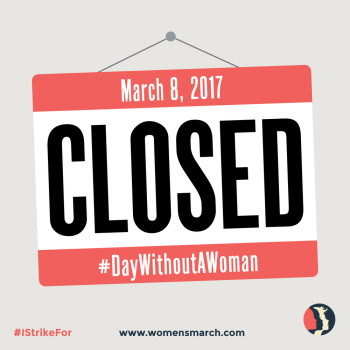
I remain devastated by the recent election, in part for how it relates to being a woman. Much has been said about the message Hillary Clinton’s loss sends to young girls. But what about me? What about other women my age? What about the message her loss sends to us?
I’ve always worked. From the time of my college graduation, which coincided with my now almost 50-years-long marriage, I held a job. I was the one who got the graduate degree while working part-time to pay the rent while my husband focused solely on getting his law degree. When said degree translated into endless hours in the office, I raised our children largely alone, cooked and cleaned and paid the monthly bills. When money was tight, I worked to help pay those bills, even with three children at home. When marital challenges arose, I made the concessions good wives make. As a homemaker, I sacrificed female friendship, a.k.a. lunches with friends and girls’ weekends, for the sake of making sure my family had clean clothes and hot dinners. As a writer, I worked around the kids’ schedules, typing away at dawn, during school hours, and late into the night. I was chronically exhausted. But I must have done something right, because my three children are now gainfully-employed men with solid marriages and children of their own.
My story isn’t unique. I’ve heard similar ones from other women who never expected to have careers but simply did what had to be done. These women were on the front lines of the work-home struggle. And where are we now?
I’m 71. All these years later, I thought things had changed. I thought women were finally on equal footing with men. I thought we had earned that right.
Apparently not. Apparently we’re only good as wage earners when it benefits someone else. Apparently our work is appreciated only until it threatens the status quo.
Call me self-pitying, but there it is. I feel used. Isn’t this what today’s Women’s Strike is about? Are we truly indispensable?
Every woman I ask claims that given her qualifications, had Hillary been male, she would have won the election. Every man I ask waffles. Well, he says, I don’t know. You have to admit, he says, that she isn’t warm and fuzzy. You have to admit, he says, that she is ambitious.
Here we are, in 2017, and this is how they see the world? I remain stunned by that. I thought America was better. I thought we were more enlightened, more respectful. Apparently I’ve been living in an alternate universe – one where intelligence is valued and hard work rewarded – where honesty is key, and religion means decency – where cream rises to the top.
I’m an optimist. But the loss I feel now, as a woman, is profound. Will I stop working in protest? I considered doing it for the sake of solidarity. But I love writing. No man tells me to do it. Actually, women do. I write for many reasons, but prime among them is that my audience appreciates — no, waits for each book I write. My readers make me feel valued.
That’s it. You all make me feel valued.
Of the many books I’ve had published, consider one from 1997. It’s about a woman whose successful career so threatens her husband’s ego that he sues for divorce and custody of the kids. My own title for it was When Being Everything Wasn’t Enough. My publisher instead chose A Woman’s Place.
A woman’s place. Talk about irony?
Of my nine grandchildren, five are girls. They are being raised to value education and hard work, are being taught to take initiative and accept responsibility. At 4:30 in the morning on the day after the election, one of my sons texted to say, “Mom, what do I tell my daughter?” He is an educator, and after saying something to his five-year-old, he had to say something to his students.
I didn’t have an answer then. I still don’t.
The post A Woman's Place appeared first on Barbara Delinsky.


